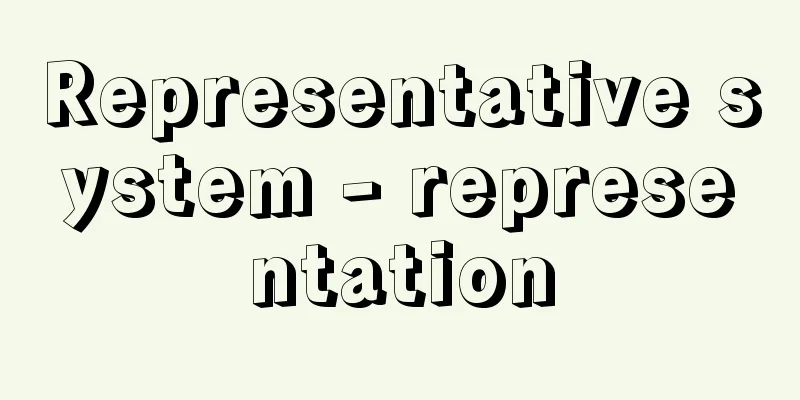Representative system - representation

|
A form of government in which the people elect representatives through voting, and the country's politics are conducted through a council of several hundred representatives. It became common with the emergence of modern nation states. It is also called indirect democracy or representative democracy, and is contrasted with direct democracy. [Hiroshi Tanaka] Representative and parliamentary systemsRepresentative systems are also used in the political management of socialist countries, which are known as communist-led democratic centralists. For example, the Soviet Union's bicameral Supreme Soviet and China's unicameral National People's Congress have different methods of selecting representatives from capitalist countries, but they can be called representative systems in that they adopt representative and indirect democracy. However, the reason why representative systems are today immediately thought of as referring to parliamentary systems and parliamentary politics in capitalist countries is due to the historical circumstances of the establishment of representative systems. In political societies that were small in area and had populations of tens or thousands of people, such as ancient Greek city-states, direct democratic politics were possible, in which representatives were selected indiscriminately from among the citizens by lottery (ballot) and rotation (rotation system), and the method of selecting representatives by voting was considered to be more of an aristocratic method. However, in modern nations with vast geographical scales and populations of millions or tens of millions, it is no longer possible, as Rousseau stated, to practice "democracy under the oak tree" (direct democracy). As a result, parliamentary systems, which are synonymous with representative systems, came to be seen as the central governing body of modern nations. Incidentally, modern parliaments have their origins in the estates assemblies that were born in the womb of medieval feudal states. Namely, each monarch began to convene an estates assembly consisting of representatives of the three estates of clergy, nobles, and commoners, in order to secure his financial base and to grasp the political situation within his domain and to achieve political unification. In England, a bicameral estates parliament was established by the end of the 13th century, and with the success of the civil revolution in the 17th century, parliament gained the status of the highest organ of state power. This newly established representative body, parliament, advocated for conducting politics based on openness and debate, rather than the secret politics of the absolute monarchy era, and for representing the entire nation, not just the estates. As a result, modern parliaments came to be almost identical to democratic politics, and thereafter, the establishment of a parliamentary system became the goal of realizing democratic politics in Western countries as well. In Japan, after the Meiji Restoration, the establishment of a national parliament was seen as a milestone in the formation of a modern nation, and through the Freedom and People's Rights Movement, the Constitution of the Empire of Japan, which established a constitutional form of government, was finally enacted in 1889 (Meiji 22), and the first Imperial Diet was opened the following year. [Hiroshi Tanaka] Representative and DemocracyFrom the perspective of democracy, which aims to realize freedom and equality, the representative system in the early modern period did not necessarily reflect the interests of all citizens. This is because the right to vote was restricted by property qualifications and gender. For this reason, from the 17th century to the mid-20th century, the expansion of the right to vote and the acquisition of universal suffrage became important political goals. In the UK, the first electoral reform in 1832 expanded the right to vote to middle-income citizens, and in 1867, urban workers were given the right to vote. Then, in 1918 and 1928, equal universal suffrage for men and women was finally implemented, and a representative system that was representative of the people in both name and reality was established. The Weimar Constitution of Germany in 1919 was the first in the world to stipulate equal universal suffrage for men and women in a constitution. In Japan, universal male suffrage was implemented in 1925 (Taisho 14), but it was not until immediately after World War II that equal universal suffrage for men and women was stipulated in the constitution, as in France and Italy. [Hiroshi Tanaka] Problems with Representative DemocracyThe realization of universal suffrage is certainly a milestone in the development of democratic politics, but it does not mean that democracy is complete. In countries with parliamentary systems, there are usually multiple political parties, and the party that wins the majority of seats in the election takes power. In this case, as is the case in many countries, the majority support is at best a comparative majority. Therefore, if the majority party uses its numerical superiority to force through policy decisions that are favorable to its faction, the function of representative democracy, which is to integrate the interests of the entire nation, will be lost. Therefore, in a representative democracy, it is important to consider how to incorporate minority opinions. The same is true in the political systems of socialist countries, where the interests of all the people are said to be represented. If freedom of debate and freedom of expression of opinions are not fully guaranteed, there is a risk of falling into bureaucratic political control like the Stalin regime. As such, representative democracy has various problems, but if parliamentary systems were abolished or their functions were suspended, as was the case in the fascist countries of Japan, Germany, and Italy, dictatorship or reign of terror would emerge. [Hiroshi Tanaka] [References] | | | |Source: Shogakukan Encyclopedia Nipponica About Encyclopedia Nipponica Information | Legend |
|
国民が投票によって代表者を選出し、代表者が構成する数百人規模の会議体を中心に国の政治を行う統治形態。近代国家の登場とともに一般化された。間接民主制、代表民主制ともよばれ、直接民主制と対比される。 [田中 浩] 代議制と議会制代議制は、広義には、共産党主導型の民主集中制といわれる社会主義国家の政治運営においても採用されている。たとえば、ソ連の二院制からなる最高ソビエト会議、中国の全国人民代表大会(一院制)は、代表者の選出方法において資本主義国家の場合とは異なるが、代表民主制、間接民主制をとる点で代議制とよぶことができる。しかし、今日、代議制といえばただちに資本主義国家における議会制や議会政治をさすものと考えられるのは、代議制成立の歴史的事情による。古代ギリシアの都市国家のように、地域的に小規模で、人口も数万、数千人程度の政治社会においては、市民のなかから抽籤(バロット)と交替制(ローテーション)(輪番制)によって無差別に代表を選ぶという直接民主制的政治が可能であり、そこでは投票によって代表を選ぶ方法のほうがむしろ貴族制的な方法と考えられていた。しかし、地域的規模が広大化し、数百万、数千万人の人口を擁する近代国家においては、もはや、ルソーも述べているように、「樫(かし)の木の下の民主主義」(直接民主制)を実行することはとうてい不可能であり、ここに、代議制の代名詞ともいうべき議会制が近代国家の中心的な統治機関と目されるようになった。 ところで、近代議会は、古くは中世封建国家の胎内で生まれた身分制議会にその起源をもつ。すなわち、各国君主は、一つにはその財政的基盤を確保するために、一つには領域内の政治状況を把握し政治的統合を図るために、僧侶(そうりょ)、貴族、庶民の三身分の代表からなる等族会議を招集するようになった。イギリスでは、13世紀末までに両院制の身分制議会が確立され、17世紀の市民革命の成功によって、議会は、国権の最高機関としての地位を獲得するに至った。この新しく設立された代議機関としての議会は、それが、かつての絶対君主時代のような秘密政治ではなく、公開制と討論を基礎に政治を行うこと、また身分代表ではなく全国民を代表することを標榜(ひょうぼう)したことによって、近代議会はほとんど民主政治と同一視されるまでになり、その後、西欧諸国においても、議会制の確立が民主政治実現の目標とされたのである。日本においても、明治維新後、国会開設が近代国家形成の指標とされ、自由民権運動を通じて、ようやく1889年(明治22)に立憲政体を定める大日本帝国憲法が制定され、翌年には第1回の帝国議会が開会された。 [田中 浩] 代議制と民主主義自由と平等の実現を目標とする民主主義という観点からすれば、近代初期の代議制はかならずしも全国民の利益を反映したものとはいえなかった。なぜなら、そこでは財産資格・性別によって選挙権が制限されていたからである。このため17世紀から20世紀中葉にかけて、選挙権の拡大や普通選挙権の獲得が重要な政治目標となる。イギリスでは、1832年に第1回の選挙法改正によって中産市民に選挙権が拡大され、1867年には都市労働者にも選挙権が与えられ、その後1918年、1928年にかけてようやく男女平等の普通選挙制が実施され、名実ともに国民代表的性格をもつ代議制が確立された。憲法上、世界で初めて男女平等の普通選挙権を規定したのは、1919年のドイツのワイマール憲法であった。日本では、1925年(大正14)に男子普通選挙制が実施されたが、男女平等の普通選挙権が憲法で規定されたのは、フランス、イタリアなどと同じく第二次世界大戦直後のことである。 [田中 浩] 代議制の問題点普通選挙制の実現は確かに民主政治の発展を示す里程標ではあるが、それだけではけっして民主政治の完成を意味しない。議会制をとる国々においては、通常、複数の政党が存在し、選挙において国民多数の支持を得て議席の過半数を占めた政党が政権を担当する。この場合、多くの国々にみられるように、多数の支持を得たといってもせいぜい比較多数にすぎない。したがって、多数党が数の優位を理由に自党派に有利な政策決定を強行するならば、代議制が本来目ざしている全国民的利益の統合という機能が失われる。そこで代議制においては、少数意見をどのようにくみ上げるかが重要である、ということになる。また、このことは、全人民の利益が代表されているといわれる社会主義国家の政治体制においても同様であって、もしも、そこにおいて討論の自由や意見発表の自由が十分に保障されなければ、スターリン体制のような官僚制的な政治支配に陥る危険性がある。 このように代議制には、さまざまな問題点があるが、かといって、かつての日独伊ファシズム国家におけるように議会制を廃止ないしはその機能を停止してしまえば、独裁政治や恐怖政治が出現するであろう。 [田中 浩] [参照項目] | | | |出典 小学館 日本大百科全書(ニッポニカ)日本大百科全書(ニッポニカ)について 情報 | 凡例 |
<<: General circulation of the atmosphere
>>: Atmospheric disturbance (atmospheric disturbance)
Recommend
Epimysium - epimysium
… Each muscle cell is surrounded by a connective ...
Pressurized fuselage
The atmospheric pressure decreases the higher you ...
Quick change - Hayagawari
A directing and acting technique in which an actor...
Artificial dialysis - Hemodialysis
◎ What is dialysis? ◎Hemodialysis ◎Peritoneal dial...
Miyabe Teizo
Year of death: 1864.7.8 (Genji 1.6.5) Year of birt...
Prenatal education
This is the idea that pregnant women should have ...
Stavisky, SA (English spelling)
…A French corruption scandal caused by a Russian-...
Jinhae period
…Gimhae-style pottery was also excavated in north...
Kenchu Yabuuchi
Year of death: 5/7/1627 (6/20/1627) Year of birth:...
Tenbuki - Tempuku
A local instrument handed down in Kagoshima Prefe...
Kaye, Danny
Born January 18, 1913 in New York, New York [Died]...
long gallery
…In Italian Renaissance mansions, corridors were ...
Fisheries Census - Gyogyō Census
This is a core statistical survey conducted by the...
Ghost story actor
...He was born in Osaka and became a disciple of ...
Ambrosius - Ambrosius (English spelling)
Bishop of Milan. One of the Four Doctors of the W...









